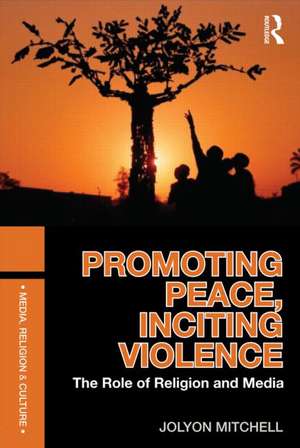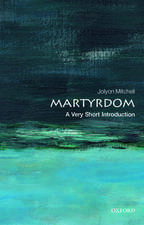Promoting Peace, Inciting Violence: The Role of Religion and Media: Media, Religion and Culture
Autor Jolyon Mitchellen Limba Engleză Paperback – 12 dec 2012
- Part One considers how various media forms can contribute to the creation of violent environments: by memorialising past hurts; by instilling fear of the ‘other’; by encouraging audiences to fight, to die or to kill neighbours for an apparently greater good.
- Part Two explores how film can bear witness to past acts of violence, how film-makers can reveal the search for truth, justice and reconciliation, and how new media can become sites for non-violent responses to terrorism and government oppression. To what extent can popular media arts contribute to imagining and building peace, transforming weapons into art, swords into ploughshares?
| Toate formatele și edițiile | Preț | Express |
|---|---|---|
| Paperback (1) | 371.64 lei 6-8 săpt. | |
| Taylor & Francis – 12 dec 2012 | 371.64 lei 6-8 săpt. | |
| Hardback (1) | 1011.30 lei 6-8 săpt. | |
| Taylor & Francis – 13 dec 2012 | 1011.30 lei 6-8 săpt. |
Preț: 371.64 lei
Nou
Puncte Express: 557
Preț estimativ în valută:
71.12€ • 77.23$ • 59.74£
71.12€ • 77.23$ • 59.74£
Carte tipărită la comandă
Livrare economică 22 aprilie-06 mai
Preluare comenzi: 021 569.72.76
Specificații
ISBN-13: 9780415557474
ISBN-10: 041555747X
Pagini: 326
Ilustrații: 35 halftones
Dimensiuni: 156 x 234 x 20 mm
Greutate: 0.5 kg
Ediția:New.
Editura: Taylor & Francis
Colecția Routledge
Seria Media, Religion and Culture
Locul publicării:Oxford, United Kingdom
ISBN-10: 041555747X
Pagini: 326
Ilustrații: 35 halftones
Dimensiuni: 156 x 234 x 20 mm
Greutate: 0.5 kg
Ediția:New.
Editura: Taylor & Francis
Colecția Routledge
Seria Media, Religion and Culture
Locul publicării:Oxford, United Kingdom
Public țintă
Postgraduate and UndergraduateCuprins
List of Illustrations. Acknowledgements. Introduction. Part One: Inciting Violence 1. Visualising Holy War 2. Celebrating Martyrdom 3. Cultivating Violence. Part One Conclusions. Part Two: Promoting Peace 4. Bearing Witness through Film 5. Searching for Truth and Reconciliation 6. Promoting Peace on Screen 7. Conclusion: ‘Swords into Ploughshares’. Notes. Bibliography. Webography. Filmography. Index.
Recenzii
"From the world's premier thinker on ethics and popular culture, a historic book on peace-building by religion and media instead of violence and war. This erudite manifesto will become a classic; it sets the agenda for one of the most complicated issues of our perilous times." - Clifford G. Christians, University of Illinois, USA
"Jolyon Mitchell has made a significant and much-needed contribution to the crucially important study of the causes of violent conflict and its nonviolent transformation. In the real world - as opposed to the university - religion, the media, politics and social movements are not divided into neat, disciplinary compartments isolated from one another, but hopelessly intertwined and implicated in the generation or diminution of conflict. Mitchell’s incisive analysis and vivid, evocative illustrations mark a major advance in the interdisciplinary approach necessary to inform the decisions and practices of peacebuilders as well as communicators." - R. Scott Appleby, University of Notre Dame, USA
"Scholars have long been perplexed by the capacity of religion to both promote peace and incite violence. Mitchell’s timely study, which examines the power of the media to both change religious practice and move adherents towards peace or violence, gets to the heart of the matter. The book is theoretically informed, alert to history and context, and draws examples from a variety of religious traditions. Lavishly illustrated and written in an engaging manner, this important study is required reading for those seeking to understand the enormous influence of religious media." - David Maxwell, University of Cambridge, UK
"The book itself is a work of art, flexing against traditional scholarly practice of narrowing one’s subject to a particular region, culture, or theoretical perspective in order to embrace what we have more broadly in common as humans: a history of violence and, presumably, the desire to build something productive, progressive, and hopeful from the ashes. If a reader can open themselves fully to the intercultural and interdisciplinary goals, the diversity of texts, and the epic scope of this work, one will find that Mitchell has created a truly fascinating and inspiring piece of scholarship: a work of intellect that is both artistic and activist, a printed example of what a sword refashioned into a ploughshare might look like." - Amber Stamper, Journal of Media, Religion and Digital Culture
"This is a superb contribution to the literature of Peace and Conflict studies... [it] is deftly organized, given the density of the research materials; readable, with more than 50 illustrations... the book would contribute to the reference shelf of any academic library of international media and religion scholars." - Claire Badaracco, Bellarmine University School of Communication, Communication Research Trends
"Jolyon Mitchell has made a significant and much-needed contribution to the crucially important study of the causes of violent conflict and its nonviolent transformation. In the real world - as opposed to the university - religion, the media, politics and social movements are not divided into neat, disciplinary compartments isolated from one another, but hopelessly intertwined and implicated in the generation or diminution of conflict. Mitchell’s incisive analysis and vivid, evocative illustrations mark a major advance in the interdisciplinary approach necessary to inform the decisions and practices of peacebuilders as well as communicators." - R. Scott Appleby, University of Notre Dame, USA
"Scholars have long been perplexed by the capacity of religion to both promote peace and incite violence. Mitchell’s timely study, which examines the power of the media to both change religious practice and move adherents towards peace or violence, gets to the heart of the matter. The book is theoretically informed, alert to history and context, and draws examples from a variety of religious traditions. Lavishly illustrated and written in an engaging manner, this important study is required reading for those seeking to understand the enormous influence of religious media." - David Maxwell, University of Cambridge, UK
"The book itself is a work of art, flexing against traditional scholarly practice of narrowing one’s subject to a particular region, culture, or theoretical perspective in order to embrace what we have more broadly in common as humans: a history of violence and, presumably, the desire to build something productive, progressive, and hopeful from the ashes. If a reader can open themselves fully to the intercultural and interdisciplinary goals, the diversity of texts, and the epic scope of this work, one will find that Mitchell has created a truly fascinating and inspiring piece of scholarship: a work of intellect that is both artistic and activist, a printed example of what a sword refashioned into a ploughshare might look like." - Amber Stamper, Journal of Media, Religion and Digital Culture
"This is a superb contribution to the literature of Peace and Conflict studies... [it] is deftly organized, given the density of the research materials; readable, with more than 50 illustrations... the book would contribute to the reference shelf of any academic library of international media and religion scholars." - Claire Badaracco, Bellarmine University School of Communication, Communication Research Trends
Descriere
This book explores the role that media and religion play in promoting peace and inciting violence, using a wide range of examples drawn from around the world.
























